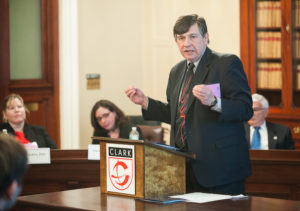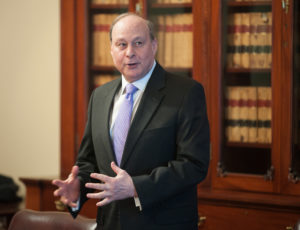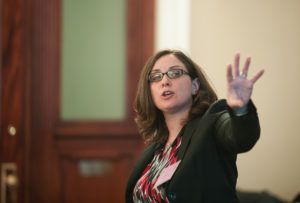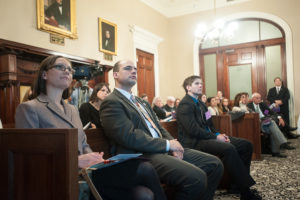
The Mosakowski Institute for Public Enterprise at Clark University launched its Family Impact Seminars in 2010, bringing together researchers and legislators to address the effect of the recession on Massachusetts families.
The seminars, planned and facilitated by FIS director Denise Hines, research associate professor of psychology at Clark, have explored a range of issues, from men’s depression to at-risk children to the societal impacts of obesity and diabetes. On March 25, the Institute convened a new Family Impact Seminar, “Mission Critical: Reforming Foster Care and Child Protective Services.” Prior to the presentations by researchers, several legislators in attendance spoke about their own experiences growing up in foster households.

Rep. Gloria Fox was raised in foster care from the age of 8, was separated from her brother at the age of 10, and didn’t reunite with him for many years. “The stability of the family is the most important thing we can have in the Commonwealth of Massachusetts,” she said. Rep. Paul Donato spent his childhood as a ward of the state because his parents were too ill to care for him and his siblings. At 18 he’d aged out of the system and had to find his own housing and work. When he ran for school committee in Medford, he was told the residents would never vote for a former ward of the state. He eventually rose to become the mayor of Medford.

Also stopping by was Senate President Stan Rosenberg, who was raised in foster care until he went away to college. He would help form the state’s first Foster Care Caucus and said he was proud to have helped shepherd through 20 pieces of legislation related to foster care. Presenter Emily M. Douglas ’95, Ph.D., of Bridgewater State University, opened the seminar by dealing with the issue of fatal child maltreatment.
She cited a recent survey of child welfare professionals that revealed a lack of knowledge about the risk factors for fatal maltreatment and in adequate training of how to recognize and deal with it.
For instance, the survey showed that the many of those responding to the survey did not realize that most children die from neglect, family members are most likely responsible for a child fatality, and parents who see their child as “difficult” are a risk factor. She recommended that child welfare professionals be better trained about the risk factors for child fatal maltreatment and that assessments for fatal maltreatment be integrated in the system, from screeners to supervisors/managers.

Case workers are prime candidates for burnout, and their work is easily misunderstood by the public, said Melinda Gushwa, Ph.D., LICSW, of the Rhode Island College School of Social Work. “People who never want our jobs say, ‘I wouldn’t have done that way; you did it wrong,” she said.
“Even on your best day, you’re feeling the weight of that, and it’s exhausting.” Gushwa said the high case load, increasing complexity of cases, and the amount of time devoted to such things as documentation, court appearances and travel has reduced face-to-face time between workers and families. The result is depersonalization of clients, demoralization, and compassion fatigue.
Gushwa said studies have shown that child welfare workers experience “secondary traumatic stress” at the same rate as survivors of plane crashes and nuclear accidents. Many see their positions as becoming overly bureaucratic.
She advised that training be improved and increased; that the state move toward more manageable caseloads; that work-life balance be honored; and that work be done to create a public narrative about the role of caseworkers.
Martha Henry, Ph.D. ’05, president of MJ Henry & Associates, counseled collaborative problem-solving among multiple stakeholders, including families, and the collection of useful data “to inform policy, practice, decision-making and resource allocation at every level of the system.” That’s not easy, she noted, since stakeholders often have competing agendas and resources, which means there is no one-size-fits-all solution. Efforts to reform the child welfare system, Henry said, should focus on quality improvement rather than compliance.
She advised adopting a common metric to understand the needs and strengths of families and make data-informed decisions. Henry said transformation is possible with an approach based on collaboration and communication that creates a shared meaning for everyone involved.
